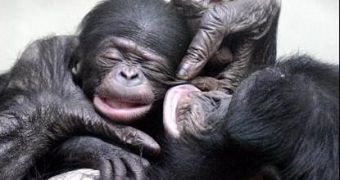We know chimps can be really nasty and male aggressiveness is already recorded in our closest species, including the male infanticide. But this goes too far: not only previously thought gentle females are equally aggressive, but it's a common practice to kill and eat the babies of other females.
Scientists can only guess that the habitat loss and human encroachment on chimpanzee territory could lead to fight for resources and aggression amongst chimps. Primatologist Jane Goodall was the first to observe this infamous female behavior in 1976 in a cannibalistic mother-daughter duo, the chimpanzees being named Passion and Pom.
The duo killed and ate together at least three chimp infants at Gombe Park in Tanzania, Goodall intervening and saving a fourth one by shouting and throwing sticks and stones. At the time, this was considered an isolated behavior. But new observation revealed three more infanticidal attacks by females in the Sonso chimpanzee community in the Ugandan Budongo Forest.
A team led by comparative psychologist Simon Townsend at the University of St. Andrews in Scotland witnessed a cruel infanticide: a bleeding mother with a one-week-old baby was chased by six females, five of which with clinging offspring themselves. In 10 minutes, after a noisy struggle, the infant was taken and killed with a bite.
Strong circumstantial evidence points at two other infanticides, also involving bites to the head, thus the killing was intentional, not accidental. In one case, adult males tried unsuccessfully to impede the infanticide by separating the females, a behavior suspected to have occurred as the males could have had sex with the attacked female in the past.
Townsend's team believes that a high influx of females in the Sonso chimp community during the last five years could have caused this lethal aggression, as food competition amongst females has increased.
All the infanticides were perpetrated by female coalitions, as it is almost impossible for a sole female to overpower a mother. The immigrant female chimps could be the cause of the dissolution of a neighboring group after the disappearance of adult males.
"Males could be killed in inter-community conflicts, or through disease, or potentially through human encroachment, but we do not know which of these factors, if any, is the most plausible," Townsend said.
"It does seem likely that as humans further encroach on chimpanzee populations we can expect to see more of this kind of aggression, as competition for resources increases among the chimpanzees." said Boston University biological anthropologist Martin Muller, not involved in this study.

 14 DAY TRIAL //
14 DAY TRIAL //